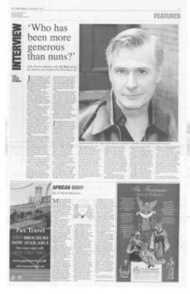Page 4, 14th December 2007
Page 4

Report an error
Noticed an error on this page?If you've noticed an error in this article please click here to report it.
Tags
Share
Related articles
Holy Year In Red Hungary
Europe
Relics Return To Rome
The Pope Frees 200 Priests For Parish Duties
Cardinal Honours Wesley In Sermon
Charles Wesley's hymns sung in Rome basilica
BY CINDY WOODEN IN ROME
CATHOLICS, Anglicans and Methodists filled Rome's Basilica of St Paul Outside the Walls with some of the most famous hymns written by Charles Wesley at a service marking the 300th anniversary of the Methodist reformer's birth.
The songs, featured in hymnals across denominational lines, were the focal point of the ecumenical evening prayer service in the Catholic basilica.
The Rev John Barrett, president of the World Methodist Council, said: "It was mindblowing really to celebrate Wesley and sing his hymns in Rome with an ecumenical gathering. "I think Charles Wesley would be thrilled. He did not write these hymns just for Methodist people, but because they expressed Christian truths."
Cardinal Walter Kasper, president of the Pontifical Council for Promoting Christian Unity, presided over the prayer service and told the congregation it was appropriate to celebrate the anniversary of Wesley's birth with his songs because it is "through these hymns that Roman Catholics have come to know and appreciate" him.
Charles Wesley and his older brother, John, were Anglican ministers who began the reform movement that eventually became the Methodist church. While John's break with the Church of England was almost total, Charles continued to serve as an Anglican minister until his death.
The younger Wesley wrote some 6,000 hymns, including "Hark! The Herald Angels Sing", "Christ the Lord Is Risen Today" and "Love Divine , All Love Excelling."
Cardinal Kasper said the "eloquent language and theological depth" of Wesley's hymns address the basic truths of Christian faith that Catholics and Methodists hold in common.
They speak of "God's universal love made known in Jesus Christ, the call to scriptural holiness and renewal of life, the sacramental life of the Church, Christian hope and the presence of the Holy Spirit," the cardinal said.
Mr Barrett told the congregation that "Methodism was born in song".
But unfortunately today even in Methodist congregations his hymns are increasingly replaced by "praise hymns long on emotion but short on theology," he said.
He said young people seem to find it difficult to sing traditional hymns, and they seem to have difficulty articulating what they believe. "I think the two are related," he added.
He said he thought too many Christians of all denominations are turning to "easy, undemanding worship songs".
"It is a great pity if you do not sing hymns with a theological content; you will not learn to articulate theological truths," he said.
Anglican Bishop John Flack, the Archbishop of Canterbury's representative in Rome, also participated in the service, which featured a quartet from the Church of England parish in Rome, an Italian Methodist choir and a Gospel choir from an African Methodist Episcopal Zion parish in Decatur, Georgia.
Bishop Flack read a message from Dr Rowan Williams, who said Wesley "made his theology so brilliantly accessible through his hymns, which taught generations of Anglicans and Methodists, and an increasingly large number of others, how to inhabit the world of scriptural and traditional imagery with grace and fervour and intelligence."
The Rev George Freeman, general secretary of the World Methodist Council, said Wesley's hymns have been used in the official CatholicMethodist dialogue to demonstrate how many essentials of faith and doctrine the two hold in common.
"We have found a resonance that, like a tuning fork, strikes a responsive chord within us both," said Mr Freeman.
"We are encouraged that our dialogue partners see the hymns of Charles Wesley as gifts to be received and as a theological source, which can assist us in working toward full communion in faith, mission and sacramental life."
blog comments powered by Disqus














